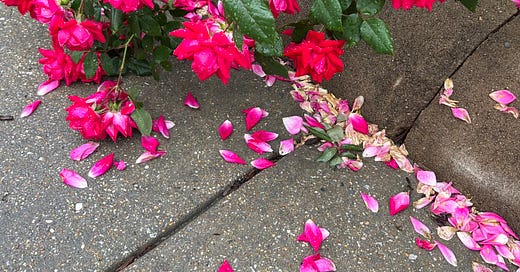Rosh Chodesh Sivan: Wilderness
Entering Sivan and approaching Shavuot, I’ve been thinking about one of my least favorite midrashim. Commenting on the first pasuk of next week’s parsha, Bamidbar Rabbah asks why the Torah emphasizes that God spoke to Moshe “בְּמִדְבַּ֥ר סִינַ֖י,” in the desert or wilderness of Sinai. One answer the midrash offers suggests wilderness as more a metaphor than a real place:
וַיְדַבֵּר ה' אֶל משֶׁה בְּמִדְבַּר סִינַי, אֶלָּא כָּל מִי שֶׁאֵינוֹ עוֹשֶׂה עַצְמוֹ כַּמִּדְבָּר, הֶפְקֵר, אֵינוֹ יָכוֹל לִקְנוֹת אֶת הַחָכְמָה וְהַתּוֹרָה, לְכָךְ נֶאֱמַר: בְּמִדְבַּר סִינָי.
“The Lord spoke to Moses in the wilderness of Sinai” – it is, that anyone who does not render himself like a wilderness, hefker, is unable to acquire wisdom and the Torah. That is why it is stated: “In the wilderness of Sinai.”
There is a range of potential meanings here. Hefker is most literally “random” or “ownerless” - if I renounce my right to an object and do not give it to anyone else, that object is then hefker.
How does a person make themselves “hefker,” then? This firstly implies a doubling – for the person is both the hefker-ifyer (my kingdom for words in English that conjugate as tidily as in Hebrew!) and the object made hefker. They are on one hand completely agential, and on the other hand, basically an object.
To be “hefker” like the Sinai wilderness could imply many different images. There is on one hand hefker like any unbounded land, wide swaths to wander through unrestrained by walls or fences. Then there is “hefker” in a sense of emptiness or possibiitiy – that the self becomes an empty lot, a cleared foundation to be built on. This version of hefker casts the ideal Torah-learning self as a tabula rasa, a blank slate ready to be shaped by Torah.
Basically the entirety of my work in queer and femininst Torah insists that we come to Torah already connected, bound, impacted by experience and community. So it is no wonder that I have found this midrash, at minimum, uninspiring. What is Torah if not the alchemical connection between who we are the and text, with the Torah shaping us and us shaping the Torah?
But this Sivan, confronting the massive unknowns of the world around me, I see this midrash less as an exhortation and more as a prayer. The murders outside the Capital Jewish Museum last week reignite familiar fears and add new ones, and we hover in a space between the event and fears about its influence and impact. Shock and horror push us to react as fast as we can. But our first and speediest reactions may not be our truest and holiest.
I am praying, this Shavuot, to find some Torah in the wilderness, of my self and of the world. I’m unsure. My avodah right now is to see that as a space where I can receive Torah, instead of a place to flee.



